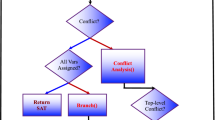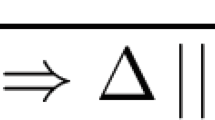Abstract
Satisfiability algorithms for propositional logic have improved enormously in recently years. This improvement increases the attractiveness of satisfiability methods for first-order logic that reduce the problem to a series of ground-level satisfiability problems. R. Jeroslow introduced a partial instantiation method of this kind that differs radically from the standard resolution-based methods. This paper lays the theoretical groundwork for an extension of his method that is general enough and efficient enough for general logic programming with indefinite clauses. In particular we improve Jeroslow's approach by (1) extending it to logic with functions, (2) accelerating it through the use of satisfiers, as introduced by Gallo and Rago, and (3) simplifying it to obtain further speedup. We provide a similar development for a “dual” partial instantiation approach defined by Hooker and suggest a primal–dual strategy. We prove correctness of the primal and dual algorithms for full first-order logic with functions, as well as termination on unsatisfiable formulas. We also report some preliminary computational results.
Similar content being viewed by others
References
Ausiello, G. and Italiano, P.: On line algorithms for polynomially solvable satisfiability problems, J. Logic Programming 10 (1991), 69–90.
Baumgartner, P.: FDPLL: A first-order Davis-Putnam-Logeman-Loveland procedure, in D. McAllester (ed.), 17th International Conference on Automated Deduction (CADE-17), Lecture Notes in Comput. Sci. 1831, Springer, 2000, pp. 200–219.
Bennaceur, H., Gouachi, I. and Plateau, G.: An incremental branch-and-bound method for the satisfiability problem, INFORMS J. Comput. 10 (1998), 301–308.
Carraresi, P., Gallo, G. and Rago, G.: A hypergraph model for constraint logic programming and application to bus drivers' scheduling, Ann. of Math. and AI 8 (1993), 247–270.
Chandru, V. and Hooker, J. N.: Optimization Methods for Logical Inference, Wiley, New York, 1999.
Chandru, V., Hooker, J. N., Rago, G. and Shrivastava, A.: A partial instantation based first order theorem prover, in Proceedings, International Workshop on First Order Theorem Proving (FTP98), Vienna, Austria, 1988. http://www.logic.at/ftp98.
Chu, H. and Plaisted, D. A.: Semantically guided first-order theorem proving using hyperlinking, in A. Bundy (ed.), Lecture Notes in Artificial Intelligence 814, Springer-Verlag, Berlin, 1994, pp. 192–206.
Church, A.: Introduction to Mathematical Logic, Part I, Princeton University Press, 1944.
Cook, S. A.: The complexity of theorem proving procedures, in Proceedings, 3rd ACM Symp. on the Theory of Computing, 1971, pp. 151–158.
Davis, M.: Eliminating the irrelevant from mechanical proofs, in Proceedings, 15th Symposium in Applied Mathematics, Amer. Math. Soc., 1963, pp. 15–30.
Davis, M. and Putnam, H.: A computing procedure for quantification theory, J. ACM 7 (1960), 201–215.
Gallo, G. and Rago, G.: A hypergraph approach to logical inference for datalog inference, Tech. Rep. 28/90, Dip. Informatica, Università di Pisa, 1990.
Gallo, G. and Rago, G.: The satisfiability problem for the Schönfinkel-Bernays fragment: Partial instantiation and hypergraph algorithms, Tech. Rep. 4/94, Dip. Informatica, Università di Pisa, 1994.
Geoffrion, A. M.: Generalized Benders decomposition, J. Optim. Theory Appl. 10 (1972), 237–260.
Hooker, J. N.: Resolution vs. cutting plane solution of inference problems: Some computational experience, Oper. Res. Lett. 7 (1988), 1–7.
Hooker, J. N.: New methods for computing inferences in first order logic, Ann. Oper. Res. (1993), 479–492.
Hooker, J. N.: Solving the incremental satisfiability problem, J. Logic Programming 15 (1993), 177–186.
Hooker, J. N. and Yan, H.: Logic circuit verification by Benders decomposition, in V. Saraswat and P. Van Hentenryck (eds.), Principles and Practice of Constraint Programming: The Newport Papers, MIT Press, Cambridge, MA, 1995, pp. 267–288.
Jaumard, B., Stan, M. and Desrosiers, J.: Tabu search and a quadratic relaxation for the satisfiability problem, Ecole Polytechnique de Montréal, Succursale A, Case Postale 6079, Montreal, Quebec H3C 3A7, Canada.
Jeroslow, R. G.: Computation-oriented reductions of predicate to propositional logic, Decision Support Systems 4 (1988), 183–197.
Jeroslow, R. G.: Logic-based Decision Support: Mixed Integer Model Formulation, Ann. of Discrete Math. 40, North-Holland, Amsterdam, 1989.
Kagan, V., Nerode, A. and Subrahmanian, V. S.: Computing definite logic programs by partial instantiation, Ann. Pure Appl. Logic 67 (1994), 161–182.
Knight, K.: Unification: A multidisciplinary survey, ACM Computing Surveys 21 (1989), 93–124.
Lee, S.-J. and Plaisted, D. A.: Eliminating duplication with the hyperlinking strategy, J. Automated Reasoning 9 (1992), 25–42.
Lloyd, J. W.: Foundations of Logic Programming, 2nd edn, Springer-Verlag, Berlin, 1987.
Mendelson, E.: Introduction to Mathematical Logic, 3rd edn, Wadsworth & Brook/Cole Advanced Books & Software, Monterey, CA, 1987.
Plaisted, D. A. and Zhu, Y.: Proceedings, 14th National Conference on Artificial Intelligence (AAAI-97), 1997.
Robinson, J. A.: A machine-oriented logic based on the resolution principle, J. ACM 12 (1965), 23–41.
Trick, M. and Johnson, D. S. (eds.): Second DIMACS Challenge: Cliques, Coloring and Satisfiability, Series in Discrete Mathematics and Theoretical Computer Science, Amer. Math. Soc., 1995.
Author information
Authors and Affiliations
Rights and permissions
About this article
Cite this article
Hooker, J.N., Rago, G., Chandru, V. et al. Partial Instantiation Methods for Inference in First-Order Logic. Journal of Automated Reasoning 28, 371–396 (2002). https://doi.org/10.1023/A:1015854101244
Issue Date:
DOI: https://doi.org/10.1023/A:1015854101244




